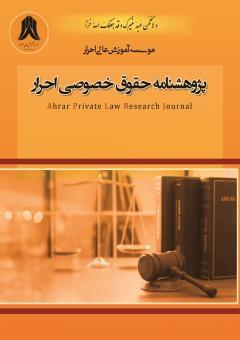The spread of the Covid-19 epidemic and its effects on the new order of the World Health Organization
محورهای موضوعی : حقوق پزشکیامیررضا محمودی 1 * , عباس تقوایی 2 , مصطفی عباسی 3
1 - استادیارحقوق عمومی، گروه حقوق، دانشکده علوم انسانی، واحد لاهیجان، دانشگاه آزاد اسلامی، لاهیجان، ایران.
2 - استادیار معارف اسلامی، گروه معارف اسلامی،دانشکده علوم انسانی، واحد لاهیجان، دانشگاه آزاداسلامی، لاهیجان، ایران.
3 - دانشجوی دکتری حقوق جزا و جرم شناسی، گروه حقوق، دانشکده علوم انسانی، واحد لاهیجان،دانشگاه آزاد اسلامی، لاهیجان، ایران.
کلید واژه: World Health Organization, Covid-19, International Health Regulations, Pandemic.,
چکیده مقاله :
The World Health Organization was founded in 1948, but its history goes back to the middle of the 19th century. The basis of this background was the need to fight epidemics that transcend the borders of countries. However, the financial and technical opportunities needed to achieve their goals and the cooperation of the member countries were not always at the optimal level and are not. Experience has shown that half of the financial resources include voluntary contributions for specific programs, but the organization refuses to develop a binding legal rule regarding them. Covid 19 acts according to the guidelines and guidelines of the World Health Organization. It should be noted that despite all the problems and some mistakes, the organization managed this process correctly with the experience gained from previous epidemics. However, time will tell whether the World Health Organization and member states can make reforms regarding the structure and how to adapt their regulations to the new global order in the field of health.
The World Health Organization was founded in 1948, but its history goes back to the middle of the 19th century. The basis of this background was the need to fight epidemics that transcend the borders of countries. However, the financial and technical opportunities needed to achieve their goals and the cooperation of the member countries were not always at the optimal level and are not. Experience has shown that half of the financial resources include voluntary contributions for specific programs, but the organization refuses to develop a binding legal rule regarding them. Covid 19 acts according to the guidelines and guidelines of the World Health Organization. It should be noted that despite all the problems and some mistakes, the organization managed this process correctly with the experience gained from previous epidemics. However, time will tell whether the World Health Organization and member states can make reforms regarding the structure and how to adapt their regulations to the new global order in the field of health.
Aginam, Obijiofor (2004), "Globalization of Infectious Diseases, International Law and the World Health
Organization: Opportunities for Synergy in Global Governance of Epidemics," New England Journal of International and Comparative Law, 11: 59-74.
Bashford, Alison (2006), "Global Biopolitics and the History of World Health," History of the Human
Sciences, 19(1) : 67-88.
Burci, Gian Luca (2019), "The World Health Organization at 70: Challenges and Adaptation,"
International Organizations Law Review, 16: Cilt 16: 229-241.
Charles, John (1968), "Origins, History, and Achievements of the World Health Organization," British
Medical Yearbook, 293-296.
Garrett, Laurie (2007), "The Challenge of Global Health," Foreign Affairs, 86(1): 14-38.
Howard-Jones, Norman (1981), "The World Health Organization in Historical Perspective,"
Perspectives in Biology and Medicine, 24(3): 467-48.
Isasi, Rosario M. ve Thu M. Nguyen (2005). The Global Governance of Infectious Diseases: The World
Health Organization and the International Health Regulations", Alberta Law Review, 43(2): 497-510.
Lawrence, Laci S.. (2012). Jurisdictional Analysis of WHO and Interpol. Journal of Biosecurity,
Biosafety and Biodefense Law, 2: 1-24
McCarthy, Michael (2002), "A Brief History of the World Health Organization", The Lancet, 360: 1111-
1112.
Nakajima, Hiroshi (1997) "Global Disease Threats and Foreign Policy," Brown Journal of World Affairs,
4,(1): 319-332.
Reddy, Srikanth K., Sumaira Mazhar, Raphael Lencucha (2018), "The Financial Sustainability of the
World.
Samancı, Uğur (2016), "Dünya Sağlık Örgütü ve Normatif İşlevi", Dokuz Eylül Üniversitesi Sosyal
Bilimler Enstitüsü Dergisi, 18(1):.55-89.
Sweileh, Waleed M. (2017), "Global Research Trends of World Health Organization's Top Eight
Emerging Pathogens," Globalization and Health, 13(9): 1-19.
Taylor, Allyn (2003), "Global Health Governance and International Law," Whittier Law Review, 25(2):
253-272.
Vaughan, Patrick, et.al (1996)., "Financing the World Health Organisation: Global Improtance of
Extrabudgetary Funds," Health Policy, 35: 229-245.
Weir, Lorna ve Eric Mykhalovskiy (2007). The Geopolitics of Global Public Health Surveillance in the
Twenty-First Century. A. Bashford (Der.), Medicine at the Border: Disease, Globalization and
Security, 1850 to Present, (London: Palgrave Macmillan) 240-263.
Worsnop, Catherine Z. (2017) , "Provoking Barriers: The 2014 Ebola Outbreak and UInintended
Consequences of WHO's Power to Declare Public Helath Emergency," Global Health
Governance, XI(1): 7-26.

